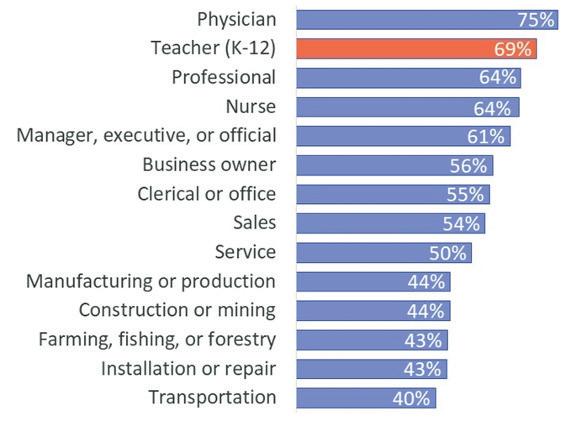Exploring Employment Options
Teacher Salaries: What to Consider When Accepting Employment Offers Sherri Morris Teacher Talent and Retention Administrator, Wake County Public School System, North Carolina
W
hen navigating the teacher job market, applicants have many factors to consider before accepting an employment offer. Teachers are often less focused on salary than on the primary considerations of grade level, subject area, number of preparations, or school location. Beginning teachers, often seeking their first “real” jobs, may not realize that salaries can vary significantly from state-to-state and from district-to-district, as well as between public, private, and charter schools. It is important for teachers to become informed about how salaries are calculated and how benefits and incentives, when combined with salary, create a total employee compensation package. Although salaries ranges can vary greatly, one commonality shared by the majority of K-12 educational organizations is that, generally speaking, teacher salaries are non-negotiable. Salaries are assigned based on pre-established salary scales. These scales typically take into account such factors as the teacher’s years of experience and educational level. For example, a fifth year teacher with a bachelor’s degree would expect to earn more than a first year teacher with the same bachelor’s degree. Similarly, a fifth year teacher who holds a master’s degree would logically anticipate earning a higher salary than a fifth year teacher with a bachelor’s degree. The education field is also beginning to differentiate pay for teachers who work in high needs schools or who teach in high demand curriculum areas like special education, math, or science. This pay differential can come in the form of a higher base salary or in additional supplemental pay. In some instances, teachers in hard-to-fill licensure areas may be eligible for signing, recruitment, and/or retention bonuses. With a little research, applicants can usually locate the school or the district’s teacher salary schedules on the organization’s website. The district’s “Human Resources” or “Jobs” pages are logical places to begin this salary scale search. In addition to their salaried pay, new teachers would be wise to consider the benefits and incentives offered by prospective employers. A less competitive salary can be made more attractive when combined with a strong benefits package. Before accepting employment offers, beginning teachers should be knowledgeable about the health, dental, vision, retirement, and other possible benefits available to them. For example: ü the employee’s cost for health insurance ü the change in cost to cover a dependent or spouse ü the inclusion of dental, vision, or prescription benefits in the health insurance coverage or if they are offered at an additional cost ü the cost of co-pays and deductibles ü the retirement savings programs (ex. 401k or 403b plans) offered and if the employer makes matching contributions ü the percentage of salary that will be deducted for retirement contributions In their quests to make informed employment decisions, new teachers can also evaluate the costs of living of various areas as they consider competing job offers. Expenses associated with housing, gas, groceries, transportation, car insurance,
84 American Association for Employment in Education
etc. are all details that can impact the financial ramifications of a specific teaching position. Numerous online cost-of-living calculators are available to aid applicants in weighing these factors. Additional questions that discerning job seekers ask themselves about the financial implications of an employment offer include: ü Do I intend to (and can I afford to) live in the community where I work? ü How far am I willing to commute to work? ü How will the distance of my commute impact me financially? ü Does the position provide tuition assistance or reimbursement if I choose to pursue a master’s, doctorate, or National Board Certification? ü Are there no-cost or low-cost opportunities for professional development? ü Will there be opportunities to supplement my income by taking on extra duties like coaching or sponsoring clubs? Accepting a first teaching job is one of the most exciting decisions in an educator’s professional life. With conscientious research, informed questioning, and careful reflection, this decision can also be one of the smartest choices of a new teacher’s career—instructionally, personally, professionally, and financially.































